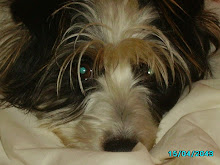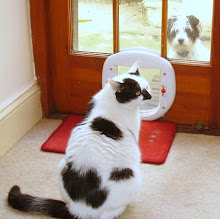Following on from my last post, I was very privileged to meet Pat Peters, who'd been a Land Girl and has written about her experiences. See pictures of her and this piece in January Cornwall Today.
Pat Peters is a good role model for us all: a hard working, independent lady with a great sense of humour. She left school at the age of 14 and went to work in a factory making greatcoats for the army as soon as war started. “I volunteered for the Women's Land Army because you had to volunteer or go into the services – and I didn't want to salute anyone!” she says with a twinkle. “And I'd always liked the land anyway.”
Pat was the last of eight siblings to leave London. Her oldest brother had already died, her next brother was injured, the third brother was in RAF in America training to be a pilot, and Pat's 19 year old sister was working in an ammunitions factory in Coventry. The three youngest members were evacuated to Devon, Pat went to Cornwall and her mother stayed in London. “We wrote regularly,” says Pat. “As soon as we got to Cornwall, we went into town and wrote postcards.”
She arrived in Cornwall on 30th August 1943 at age 17. “The thing I remember most is St Michael's Mount,” she says in her quiet voice, with an undercurrent of laughter. “We came by train and thought - what was that? We'd never seen anything it before.”
Pat joined a gang of twenty Land Girls, all from very different backgrounds, but they all got on very well. “There wasn't one argument between us,” she says proudly, then laughs. “We argued with the foreman but not with the girls – we stuck up for one another. We were all in the same boat.” Here Pat met Kay and Pauline, though Kay eventually went back to London and Pauline went to another farm in Kent. But these best friends visited each other regularly and kept in touch for the rest of their lives.
“We learned a lot of camaraderie in the war,” explains Pat. “There was friendship wherever you went.” She adds sadly, “Kay would have loved this – I really regret that she's not here to share this.” But another voice from the past has just emerged. “The farmer's wife where we were billeted has got in touch,” says Pat with a smile. “She's 93 and still lives on the farm that her older daughter runs now. I'm longing to see them.”
Most of us find it difficult to imagine wartime life. “What I loved most was the freedom,” Pat says. With many people dead, dying and risking their lives every day, that freedom must have been intensified. “Once we got back from work, time was our own, whereas the forces were very regimented. They had to salute for their wages, did you know?” She laughs. “I thought, after a week's work? No way - we've worked for that!”
There was no denying it was hard work. “The worst thing was getting wet and cold,” says Pat ruefully. “If the cattle lorry that took us to and from work wasn't around, we had to sit in the hedge and, oh it was terrible.”
Once they had finished work, they found plenty to amuse themselves. “There were no dances till the Americans came,” Pat says. “But there was a little cinema – called the flea pit by the locals. Or we'd roam around town or go and have a drink at one of the pubs.” But some, like the landlady of the Cornish Arms, didn't approve of Land Girls. “Just because you came from London they thought you were no good,” Pat explains.
Pat was fortunate in being billeted on a farm where the food was good. “Mrs Gill made pasties and sponges, and if she was short on potatoes we used to stuff them down our trousers and bring them home!” But the other girls didn't do so well. “They had fish paste sandwiches that were so bad they threw them to the seagulls and went hungry.”
For many, like Pat, the war let women into a man's world and they never looked back. “Women only started wearing trousers during the war,” she explains. This was a massive breakthrough in the emancipation of women, who for the first time were allowed not only to wear trousers, but to do men's work. So Pat has kept her breeches, dungarees and milking jacket as a reminder of happy times.
Pat grew to love Cornwall, and one day, a young farmer called Gordon asked her to a dance in Helston. Afterwards, Pat wasn't sure about getting into a car with a strange man so she asked if she could drive the car. “I could drive a tractor but I'd never driven a car,” she says. “When I got back to Joe Pascoe's farm, I pressed the accelerator and the brake together and went straight into a wall!”
However, the dent in the wall didn't stop their romance, and married life for Pat and Gordon started off at Polwin Manor farm with Gordon's brother and his wife. “We moved after 3 years,” says Pat. “When my oldest was young there was water coming in one door and out the other. That was terrible. I thought he was going to die. That was the only time I wanted to go back to London and my mum.”
They moved to the Helston area where Gordon managed four farms, and Pat has stayed in the area ever since, though sadly Gordon died in 1998. Now a proud great grandmother who has worked incredibly hard all her life, Pat is well aware of how lucky her offspring are. “We left school and worked straight away. There was no dole in our day,” she says firmly. “Nowadays they take everything for granted. They have money in their hands when they leave school and I do think that's wrong.”
She is also sad at how standards have dwindled. “I would teach youngsters respect for one thing,” says Pat. “All they seem to do is go out and cause damage. We never looked to break things or hurt people. We just didn't.” She looks up and smiles. “The worst thing we ever did was knock on someone's door and run!”
The idea for writing a book came about gradually. “I used to write a lot of poetry,” says Pat. “And I'd always wanted to write a book – things popped up and I used to write them down in an old notebook.” But Kay and Pauline helped Pat. “It's thanks to them that this has happened,” says Pat. ”I should have thanked them for jogging my memory and put that in the book.”
Like most people, Pat found publication very difficult. “I sent the book to various people who all said they liked it but no one took it up,” she says. She made it longer, put in more description – and still had no luck. “After four or five rejections, I thought the book was no good, so it stuck in that drawer,” she says. But then she met Angie Butler, who was captivated by her story and helped her find a publisher. “I wanted to thank Angie in the book as well,” says Pat.
Cornwall became home for Pat many years ago and she has never looked back. “When I used to go to London to see family and friends I couldn't get back quick enough.” She smiles. “I love the quietness, and the greenery. There's a farm up the road and I used to walk up there because I love the smell of dung! It might sound silly, but it's a farm smell.”
While farming has shaped Pat's life, it's her special friendships that have meant so much to her. “You've got to have a sense of humour and look at things positively,” she says firmly. “I hope anyone who reads the book has a good laugh. But keeping friendships is the most important thing.”
A perfect example of this was when Pat spilt a bottle of Kay's precious perfume. “I knew she'd be furious,” says Pat. “There was a blue box of perfume, soap and talc and we'd never seen anything like that.” Despite the spillage, they made up and remained staunch friends, but years later when Kay came to stay, Pat decided to get her own back. “I hid a bottle on the dressing table and on the box I wrote a card saying,
Welcome! You have my permission to use this 'notorious' perfume but
DO NOT SPILL A DROP!
Like the perfume, our friendship lingers on.
Yours WLA pal
Pat x
Land Girls Gang Up by Pat Peters £7.95
Old Pond Publishing www.oldpond.com
Thursday, 7 January 2010
Subscribe to:
Post Comments (Atom)














24 comments:
I have always found the Land Girls fascinating. The farmer's mum was one, she worked on a farm nearby which is how she met his dad who lived on this farm all his life. They were very hard working women and could show us a lot about hard graft!
CJ xx
What an incredible woman with a great story to tell.
CJ - they certainly could! Nothing mamsy pamsy (sp?) about them!
What a great true story, thanks for sharing FP. :)
Wonderful story.
God, I envy you, FP!
Lovely post FP, thank you for sharing x
Colette - I felt very humbled by meeting her - and she has such a lovely sense of humour!
Ak - and there are many more like her too.
Elaine - yes, there are definite perks to this job!
Mandy - I feel her story is more than worth telling. And what an unassuming lady. Very humbling.
What a lovely story FP, and a lovely, modest sounding lady!
I'll try and get hold of that book.
Di.x
P.S. -8 here, I hope you're keeping warm.Dx
My mother-in-law was a land army girl too and those memories stayed with her to the end. It is great hearing these stories, and I'm so pleased she found a publisher.
What an interesting story that lady has to tell.
Trubes - yes, she is. I hope she's OK now as she lives ina very rural part of Cornwall. Its about 2 degrees here so warmer than with you!
Ellee - they are a fascinating lot of women arent they? She'd given up getting apublisher but someone I met found her one. Very good news!
Debs - she certainly has!
That sounds a wonderful and interesting book. Thanks so much for writing such a fascinating post, FP.
Thank you Phil!
You know the chinese is a porn link, yeah?
Phil - I didnt look. Shall now delete!
Sorry Sue, I read this earlier on a whistle-stop day and didn't manage to comment. I loved 'meeting' Pat and I'm so thrilled she's now published.
Chris - she's so pleased too!
Im reading a book about a landgirl during the war..... its only a novel but still its based on true things.....
If I had been around in those times, that is what I would of loved to of done for the war effort....
She certainly sounds like the most amazing woman..
x
Marmie - good for you!
Post a Comment